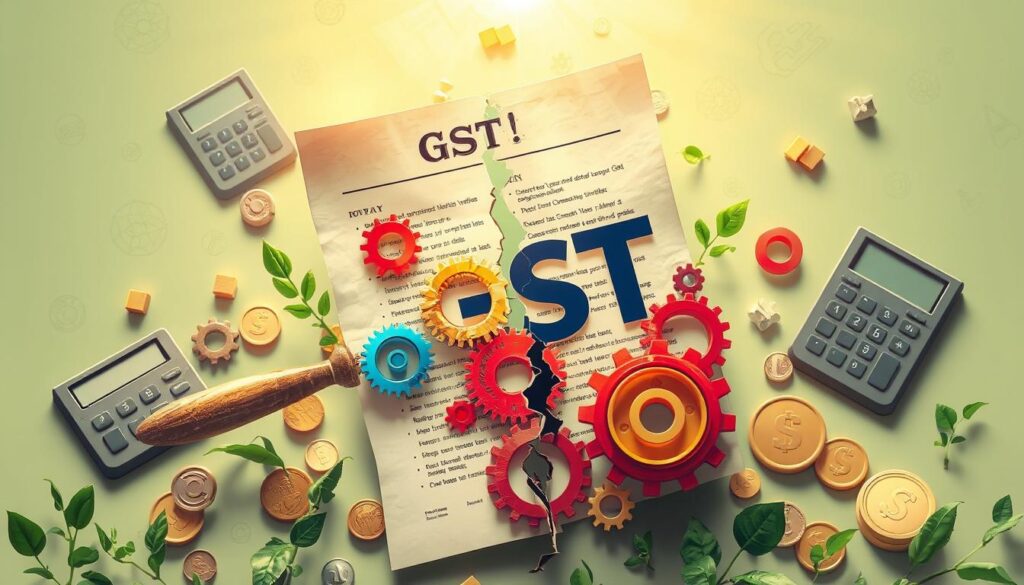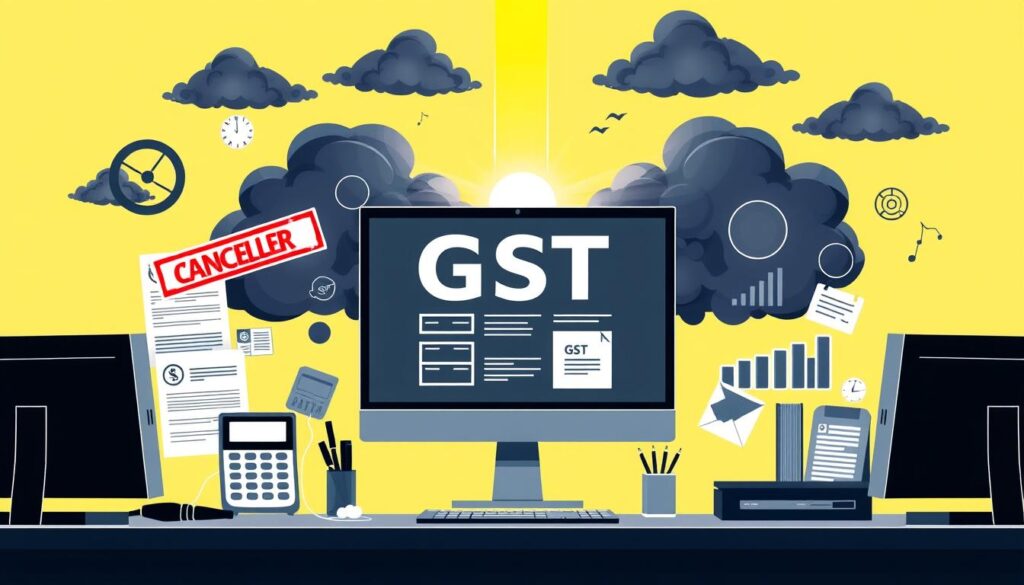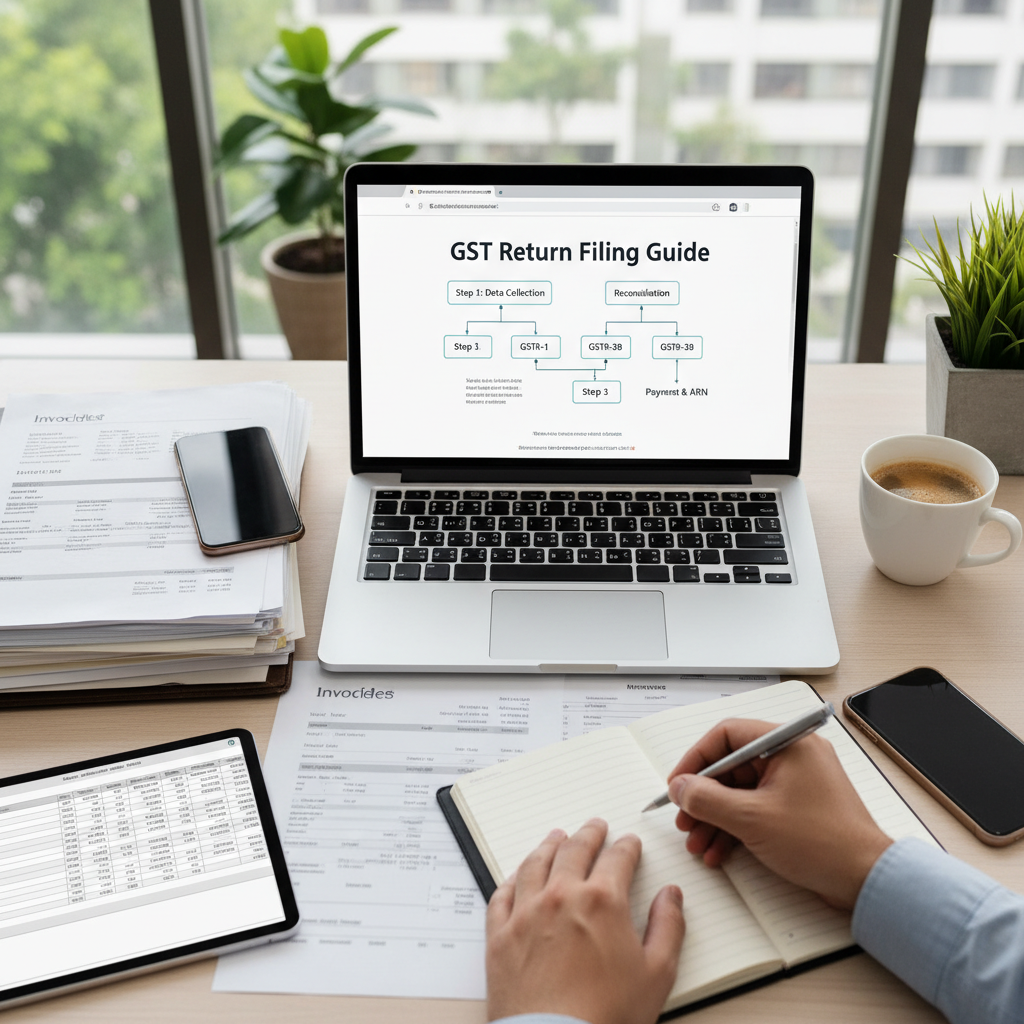Imagine your business faced unexpected challenges, leading to the cancellation of your GST registration. But what if you’re now in a position to reactivate your GST registration? You often ask one question your self that How to Revoke Cancelled GST Registration After 180 Days? The answer may surprise you.
In India’s Goods and Services Tax (GST) system, knowing how to revoke is key for businesses. Recently, the time to apply for revocation was extended from 30 days to 90 days, starting October 1, 2023. But what if your registration was cancelled over 180 days ago? Can you still revoke it, and if so, how?
Understanding GST Registration Cancellation
In India, canceling GST registration can affect businesses a lot. It can happen if the business wants to stop or if the GST officer decides. Knowing why and how it impacts businesses is key to understanding taxes.
Reasons for GST Registration Cancellation
There are main reasons for canceling GST registration. These include not filing returns, closing the business, or changing its structure. If a business doesn’t file returns for six months, the GST officer might cancel it. Businesses can also choose to cancel if they close or change.
Also, the GST officer can cancel it if there’s non-compliance. This includes not paying taxes or issuing wrong invoices. Businesses get a chance to explain before their registration is canceled.
Impact of GST Registration Cancellation on Businesses
Canceling GST registration affects businesses a lot. It means they don’t have to follow GST rules anymore. But, they can’t collect or pay GST, which messes with their money.
It also stops them from doing many business things. This includes making invoices and claiming tax credits. It can hurt their business and money health a lot.
It’s important to know why GST registration is canceled and how it affects businesses. This helps them make good choices and handle the change well.

How to Revoke Cancelled GST Registration After 180 Days
Revocation of Cancelled GST Registration
Businesses in India might face the tough situation of having their GST registration cancelled. But, there’s a chance to undo this and get back to normal. Knowing when and how to revoke a cancelled GST registration is key for business owners.
Eligibility Criteria for Revocation
To get a cancelled GST registration back, some rules must be followed. Businesses need to file all pending returns and pay any taxes owed. They also have to give a good reason for the cancellation and show they’ve fixed the problems.
Benefits of Revoking Cancelled GST Registration
- Resuming normal business operations: Revoking a cancelled GST registration lets the business get back to work. This includes making invoices, claiming tax credits, and joining the GST system again.
- GST revocation eligibility: Getting back to claim tax credits: With a revoked GST registration, businesses can start claiming tax credits on their purchases. This boosts their financial health.
- benefits of GST revocation: Restoring compliance status: Revoking the cancelled GST registration helps businesses regain their tax compliance. This improves their market reputation and credibility.
Understanding the rules and benefits of revoking a cancelled GST registration is crucial. Businesses can then fix their issues and get back to work smoothly.

Time Limit for Revocation Application
The time frame for revoking a cancelled GST registration is key. The standard time is 90 days from the cancellation order. But, in special cases, it can go up to 180 days with the Commissioner’s approval.
The Central Board of Indirect Taxes & Customs (CBIC) has made clear the time limits for revocation. This includes cases affected by COVID-19. Businesses need to know these rules to file their applications on time.
Key Timelines to Remember
- The standard time limit for filing a revocation application is 90 days from the date of the cancellation order.
- In special cases, the Commissioner can grant an extension of up to 180 days upon sufficient cause being shown.
- A circular issued by the CBIC in 2021 extended the time limit to apply for revocation up to 30th September 2021 for taxpayers whose registration revocation expired between 1st March 2020 and 31st August 2021, considering the challenges posed by the COVID-19 pandemic.
- The officer must revoke the cancelled GST registration within 30 days from the date of receiving the revocation application filed by the taxpayer.
- The taxpayer has 7 days to respond to a notice issued asking why the registration should not be revoked.
- All returns pending from the date of cancellation until the date of the revocation order must be filed within 30 days from the date of revocation.
Businesses must keep up with GST revocation time limits and appeal processes. This ensures applications are filed on time and avoids legal issues.
Step-by-Step Guide to Revoke Cancelled GST Registration
If your GST registration was cancelled, you might be able to get it back. You need to use the GST portal, fill out Form GST REG-21, and provide the right info and documents. Here’s how to do it:
Accessing the GST Portal
First, log in to the GST Portal. Then, go to the “Registration” section. Choose the option to file Form GST REG-21.
Filing Form GST REG-21
The Form GST REG-21 is for cancelling a GST registration. You’ll need to give some details:
- Why you want to revoke the cancellation
- Details of the cancelled registration, like the number and cancellation date
- Any pending returns or outstanding liabilities
- Supporting documents, like proof of address and identity
Providing Necessary Information and Documents
Before you submit Form GST REG-21, make sure you have all the needed info and documents. This includes:
- Proof of identity and address
- Copies of any pending returns or outstanding liabilities
- Any other documents that support your request
After filling out the form and attaching the documents, you can submit your application. This will start the process to get your GST registration back.
As of 1st October 2023, you now have 90 days to apply for revocation. This change gives businesses more time to fix their registration and keep running smoothly.
How to Revoke Cancelled GST Registration After 180 Days
Revoking a cancelled GST registration after 180 days needs careful thought and extra steps. Businesses must explain why they’re late and might need approval from higher-ups. GST officers will check if all GST duties are met.
Special Circumstances for Revocation Beyond 180 Days
Businesses wanting to revoke their GST registration after 180 days must show special reasons. This could be:
- Severe financial trouble or business disruptions they can’t control
- Legal or regulatory issues that made it hard to apply for revocation
- Proof that they’ve kept trying to follow GST rules
Additional Requirements for Late Revocation
For revocation after 180 days, businesses must do more. They need to:
- Provide detailed documents, like financial reports or legal papers, to back their claim
- Meet all GST duties, including filing returns and paying any debts
- Go through interviews with GST officers to explain their situation
- Get approval from higher officials, like the Commissioner, for the late request
The GST authorities will look closely at each late revocation request. They make sure the business has a good reason and has done everything needed before saying yes.
Common Mistakes to Avoid During Revocation Process
Revoking a cancelled GST registration can be tricky. Taxpayers need to watch out for common mistakes that can cause their application to be rejected. Some frequent errors include:
- Incomplete form filling: Taxpayers must fill out the GST REG-21 form correctly and completely. They need to provide all the required information and supporting documents.
- Failure to attach necessary documents: Not submitting the needed documents, like proof of business or resolving liabilities, can lead to application rejection.
- Not addressing all reasons for cancellation: Taxpayers must explain all reasons for the GST registration cancellation in their application. They need to show they’ve fixed the problems that caused the cancellation.
- Overlooking pending returns or dues: Taxpayers must clear all outstanding GST returns and dues before applying for revocation. The tax authorities won’t process the application until compliance is restored.
To avoid these GST revocation mistakes and revocation application errors, taxpayers should carefully check the application requirements. They should gather all necessary documents and make sure their GST compliance is current before submitting the revocation request. By doing this, businesses can boost their chances of a successful GST registration revocation.
| Mistake | Impact | Recommendation |
|---|---|---|
| Incomplete form filling | Rejection of revocation application | Carefully review and fill out the GST REG-21 form |
| Failure to attach necessary documents | Rejection of revocation application | Gather and submit all required supporting documents |
| Not addressing all reasons for cancellation | Rejection of revocation application | Ensure all issues leading to cancellation are resolved |
| Overlooking pending returns or dues | Delayed or rejected revocation application | Clear all outstanding GST returns and dues before applying |
“Attention to detail is crucial when revoking a cancelled GST registration. Taxpayers must be diligent in addressing all requirements to ensure a successful outcome.”
Consequences of Not Revoking Cancelled GST Registration
Not revoking a cancelled GST registration can cause serious legal problems. It can also hurt your business operations a lot. You should not ignore the need to revoke a cancelled GST registration.
Legal Implications
Not revoking a cancelled GST registration can lead to penalties. Businesses might face charges for tax evasion or other legal issues. This can risk your financial health and reputation.
Ignoring the revocation process can lead to legal troubles. It’s best to take action quickly to avoid these problems.
Impact on Business Operations
Without a valid GST registration, you can’t issue tax invoices. This is key for doing business with other GST-registered entities. It can really mess up your business operations.
It also means you can’t claim input tax credits. This can hurt your finances a lot. Not revoking a cancelled GST registration can damage your business’s reputation and financial health in the long run.
| Consequence | Description |
|---|---|
| Penalties for non-compliance | Businesses may face penalties for tax evasion or other legal issues due to failure to revoke a cancelled GST registration. |
| Inability to issue tax invoices | Without a valid GST registration, businesses cannot issue tax invoices, disrupting their operations and transactions. |
| Loss of input tax credits | Businesses will be unable to claim input tax credits, negatively impacting their financial performance. |
| Damage to business reputation | The long-term consequences of not revoking a cancelled GST registration can include reputational damage and financial instability. |
To avoid the bad effects of not revoking a cancelled GST registration, businesses must act fast. They need to follow the right steps to get their GST registration back.
Seeking Professional Assistance for Revocation
Revoking a cancelled GST registration can be tricky, especially if it’s been over 180 days. Getting help from a GST expert makes it easier. They ensure the application is done right and on time.
Benefits of Engaging a GST Expert
- A professional GST service provider prepares and submits all needed forms and documents. This reduces the chance of mistakes or delays.
- They offer guidance for complex cases. For example, if the cancellation was due to fraud or non-compliance, they know what extra steps are needed.
- Tax experts keep up with GST rules and deadlines. This means the revocation process follows the latest guidelines.
Choosing the Right Professional Service Provider
When picking a GST expert or service provider for revocation, consider these points:
- Look for someone with experience in GST matters. They should have a good track record of revoking cancelled GST registrations.
- Choose a provider who knows the latest GST rules and deadlines. This ensures the process is done correctly and on time.
- Check the provider’s reputation and read client testimonials. This helps you understand the quality of their services and client satisfaction.
Working with a well-known chartered accountant or tax consultant is very helpful. They are key in revoking a cancelled GST registration, especially if it’s been over 180 days.
Alternatives to GST Registration Revocation
If you can’t get your GST registration back, there are other ways to handle your tax needs. You could get a new GST number, change your business structure, or pick a business model that doesn’t need GST.
Applying for a New GST Registration
Getting a new GST number is an option if your old one is cancelled. This is good if your business has changed a lot, like a new owner or different activities. But, make sure you meet all the new rules.
Business Restructuring
Changing how your business is set up is another choice. You might turn it into a partnership or a company. This could help you get a new GST number and fix the problems from before.
Exploring Alternative Business Models
Some businesses might not need GST anymore. You could change to a service or a small trader. This big change might work for some, but it’s a big step.
Every option has its own ups and downs. It’s key to think about your business’s needs and talk to tax and legal experts. They can help you pick the best way to keep your business running smoothly.
| Alternative | Description | Potential Benefits | Potential Challenges |
|---|---|---|---|
| New GST Registration | Applying for a new GST registration after the previous one has been cancelled |
|
|
| Business Restructuring | Restructuring the business entity, such as changing from a sole proprietorship to a partnership or private limited company |
|
|
| Alternative Business Models | Transitioning to a business model that does not require GST registration, such as becoming a service provider or a small-scale trader |
|
|
Think carefully about your GST registration alternatives and business restructuring options. Each choice has its own effects on your business. Getting advice from tax and legal experts can help you make the right choice for your business.
Case Studies: Successful GST Registration Revocations
Revoking a cancelled GST registration can be tough, but many businesses have done it. These GST revocation success stories give insights for others in similar situations.
Real-Life Examples of Businesses Revoking Cancelled GST Registration
A small manufacturing firm had its GST registration cancelled for not filing tax returns. They quickly filed the needed papers and gave the tax authorities what they asked for. After checking everything, the firm got their registration back, and they could keep working.
A retail chain had trouble with GST compliance because of internal issues. But they got help and managed to get their registration back on time. This fixed their tax problems and helped them do better with GST compliance lessons in the future.
These stories show how important it is to stay alert, keep good records, and get help when you face GST cancellation. By learning from these successes, businesses can handle the revocation process better and keep their operations running smoothly.
| Key Takeaways from GST Revocation Success Stories |
|---|
|
These examples show that with the right steps and care, businesses can get their GST registration back. By following these GST revocation success stories and GST compliance lessons, other companies can deal with GST cancellation and keep their business going.
Conclusion
Revoking a cancelled GST registration in India is key for businesses to stay tax compliant. This ensures they can keep running smoothly. The usual time to do this is 30 days after getting the cancellation order. But, the government gives up to 180 days extra for special cases.
To undo a cancelled GST registration after 180 days, follow the steps in this article carefully. You need to get to the GST portal, fill out Form GST REG-21, and add the right documents. Getting help from a GST expert can make this easier and more likely to succeed.
Having an active GST registration is not just the law; it’s also good for business. It helps with invoicing, collecting GST, and claiming input tax credits. Not revoking a cancelled GST registration can cause big legal and financial problems. So, it’s vital to act quickly and understand how GST revocation works. This way, businesses can keep their operations going without issues in India’s tax system.
FAQ
Q: Can we revoke a cancelled GST registration after 180 days?
Q: What are the benefits of revoking a cancelled GST registration?
Q: What is the time limit for applying for GST registration revocation?
Q: How do I revoke my cancelled GST registration after 180 days?
Q: What are some common mistakes to avoid during the GST revocation process?
Q: What are the consequences of not revoking a cancelled GST registration?
Q: How can a GST expert help with the revocation process?
Please Rate this post
Click to rate










